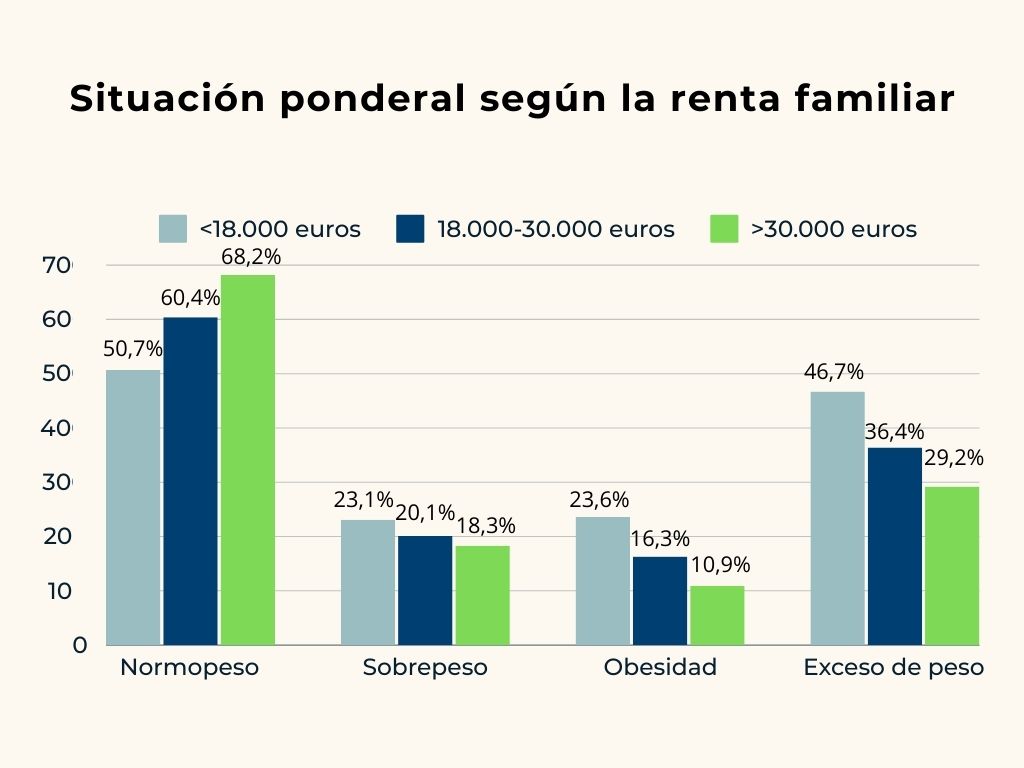More than a third of Spanish schoolchildren between 6 and 9 years old are overweight, as reflected in the 5th edition of the Aladdin report on nutrition, physical activity, child development and obesitywhose results were presented on Wednesday by the Ministry of Social Rights, Consumption and Agenda 2030.
For the 2023 study – it is done every four years and the last one is from 2019, before the pandemic – the weight and height of the children have been directly measured. 12,678 students from 296 schools, both public and private, from all autonomous communitiesIn addition, their families and centres have completed questionnaires about their habits and lifestyles.
Thus, 2.7% of them are thin; 61.2% are of normal weight, 20.2% overweight and 15.9% obesewhich results in 36.1% of children being overweight (a figure that results from adding those of overweight and obesity).
Evolution of the weight situation.
Although Spain has improved in these last two indicators since the last study – specifically, excess weight has improved by 4.5% compared to 2019, since overweight has dropped by 3.1 points and obesity, by 1.4 – they still register high levels. It should be remembered that overweight and childhood obesity “are associated with numerous health complications and entail a serious public health problem“, the Ministry emphasizes.
Gap according to income level
Furthermore, the improvement has not occurred in all income strata: it has hardly occurred among schoolchildren with lower incomes.
In fact, the prevalence of the Obesity among children whose family income is less than 18,000 euros per year is 23.6%. In other words, it affects almost one in four children. Among those with a family income of over 30,000 euros per year, obesity is 10.9% – one in ten.

Weight situation based on annual gross family income.
The difference in income is behind some inequalities in habits in families that can explain these data. For example, those with lower incomes register a lower frequency of daily consumption of fruits and vegetablesespecially the latter; tend to have a less than complete breakfast, drink more sugary soft drinks or have less access to extracurricular activities related to sport, exercise or dance. In addition, the number of schoolchildren who spend two or more hours a day using screens doubles in these areas.
Little fruit and vegetables
The study, which among other things provides a snapshot of what schoolchildren’s diet is like, shows that seven out of ten schoolchildren eat something more than a drink for breakfast (thus, 30% do not eat anything). The percentage is 17 percentage points lower in the case of families with lower incomes compared to those with high incomes.
Less than half (45.3% of schoolchildren) eat fruit daily and less than a quarter (23.8%) eat vegetables. Again, the lower the income, the lower the consumption of these foods.
3.8% of children between 6 and 9 years old consume sugary soft drinks more than three days a week. Consumption is more than eight times higher in lower-income families than in wealthier ones.
Movement and screen time
The study also reflects that Seven out of ten children spend at least one hour a day playing actively and 81.8% do at least two hours a week of some kind of extracurricular activity that involves exercise. Here the contrast is between girls from lower-income families (64.2% do it) and those from higher-income families (88.1%).
As for screen time, three out of ten schoolchildren are exposed to more than two hours a day: in lower-income households, the percentage of children is double that of households with higher income levels (41.4% versus 22.8%).
In addition to continuing to promote healthy habits, the Spanish Agency for Food Safety and Nutrition, the body responsible for carrying out the Aladino study in our country, highlights the importance of epidemiological surveillance against childhood overweight and obesity. The Ministry of Social Affairs, Consumption and Agenda 2030 is still pending the regulation of healthy eating in school canteens, whose project is in process, and the one of advertising unhealthy baby foodfor which there is no established deadline.
Source: www.huffingtonpost.es


